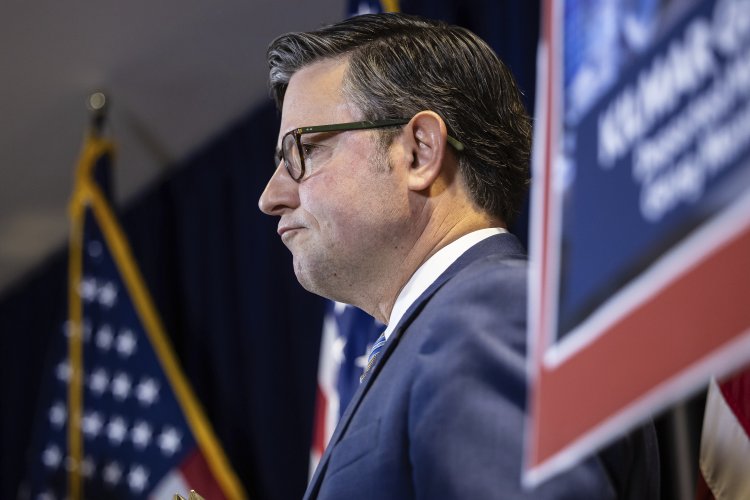Challenges Mount for the GOP's Comprehensive Legislation
The House's initial missteps illustrate a distinct reality: Trump’s “big, beautiful bill” lacks readiness for prime time.

During the early phases of legislative drafting and discussions held across several House committees this week, it became evident that Republicans are having difficulty finding consensus on significant issues, such as the extent of spending cuts and modifications to safety-net programs. Additionally, they are navigating an array of unforeseen controversies, including a contentious car tax included in a legislative draft by one committee chair, along with attempts by others to use the party-line megabill to advance individual priorities.
The current situation suggests that President Donald Trump’s vision for a “big, beautiful bill” is far from being operational.
Diverging factions within the Republicans are drawing new red lines, making it challenging for House leaders to find common ground. This discord comes before Senate members have the chance to offer their amendments to the evolving plan. Furthermore, Speaker Mike Johnson’s self-imposed timeline to pass a bill through the House by Memorial Day seems increasingly unattainable.
“I don't think we're on the same page — even inside the House, much less between the House and the Senate,” stated Rep. Chip Roy, a leader among hard-right members advocating for substantial spending cuts.
Already, Johnson's rough May plan appears to be unraveling. Committees focused on less critical elements of the bill have managed to stay on course by releasing and advancing legislative language. They hoped that next week, committees dealing with major tax and benefit program provisions would complete their work, allowing for final votes in both the Budget Committee and on the floor in the ensuing weeks.
However, significant policy disagreements are causing delays, leading GOP leaders to postpone a trio of crucial votes they intended to conclude next week. The Energy and Commerce Committee is still struggling with proposals to reduce Medicaid spending that are politically sensitive. The Ways and Means Committee finds itself in a stalemate over a key deduction commonly used in swing blue-state districts. Meanwhile, the Agriculture Committee continues to face challenges in achieving the $230 billion in spending cuts aimed at the country’s largest anti-hunger initiative, amid pushback from centrist members.
Part of the chaos stems from the fact that although some GOP leaders and committee chairs may have a clear vision for the bill, many rank-and-file members do not. Tensions have escalated as lawmakers have been briefed on crucial components of the developing legislation, which could significantly affect their states and districts.
For example, Rep. Derrick Van Orden walked out of a briefing with Agriculture Committee GOP members this week due to a proposal that would transfer some federal food aid expenses to states for the first time. “What staffer thought of this?” he exclaimed as he exited. He later issued a public letter criticizing the proposal, which would place additional burdens on state budgets.
In another private meeting, Energy and Commerce Chair Brett Guthrie encountered resistance from the ultraconservative House Freedom Caucus as he attempted to clarify the complexities surrounding potential Medicaid cuts. When Guthrie and others pointed out that some states have enacted so-called trigger laws that would remove hundreds of thousands of residents from benefit rolls if federal funding decreases, Rep. Eric Burlison retorted, “That’s not our problem.”
Simultaneously, Republicans from Virginia and other Medicaid expansion states warned GOP leaders that the proposals to reduce the federal funding share for the joint state-federal program lacked sufficient votes for passage.
Additionally, when Transportation and Infrastructure Chair Sam Graves revealed a proposed $20 annual fee for national passenger vehicles in his section of the bill, many members of the House GOP were caught off guard. “There was a collective ‘WTF,’” remarked one senior GOP aide, who spoke anonymously about the internal reactions. Graves quickly reversed this proposal less than 24 hours later.
As House Republicans navigate their internal complexities, GOP senators have made it clear that they will not automatically accept significant components of what the House is contemplating. They also noted the House’s rapid changes this week, such as on the vehicle tax, indicating that their GOP counterparts might alter their plans if the backlash escalates.
While the House is deliberating sweeping changes, including dismantling the Medicaid expansion from the Affordable Care Act and shifting food-aid costs to states, Senate Republicans are pursuing much narrower adjustments.
In a closed-door briefing this week, Senate Republicans concentrated their discussions on implementing new work requirements for Medicaid, requiring states to strengthen eligibility checks, and removing undocumented immigrants, who are generally already ineligible. Although some Senate conservatives support the Freedom Caucus's initiatives, several GOP senators have expressed that more significant benefit reductions are not under consideration.
“I’ve talked to a number of House members, a number of whom actually reached out to me and said — and by ‘a number’ I mean upwards of a dozen — who said, ‘We’re not going to vote for Medicaid payments cuts,’” shared Sen. Josh Hawley.
This growing divide is creating a political challenge for Johnson, as many House Republicans are apprehensive about being compelled to vote for spending cuts that may not survive in the Senate—and facing electoral repercussions in 2026.
Yet, scaling back changes to Medicaid is likely to frustrate the hard-line conservatives whose support Johnson ultimately needs to shepherd the bill through the House. Roy cautioned that he would “openly, on the microphone, on TV, laugh at the United States Senate if they think they’re going to come back and say, ‘Sorry we couldn’t deliver on Medicaid reform, but we still want our tax cut permanence.’”
The Senate Republicans are employing a similar strategy regarding changes to food aid. While House leaders are considering substantial overhauls that would pass costs onto states, one member of the Senate Agriculture Committee, speaking anonymously, indicated that the primary ideas now under consideration for the Supplemental Nutrition Assistance Program are imposing stricter work requirements and ensuring “accountability” for state administration of assistance.
That represents just one of the fault lines separating the approaches of the House and Senate: Senators are operating on an entirely different timetable, aiming to conclude their work by July 4—though even Majority Leader John Thune has characterized that target as “aspirational.” They are currently postponing committee meetings to debate the bill while assessing how closely the House can produce a version likely to pass in the Senate.
The Senate GOP faces its own fiscal conservatives, with various Republicans insisting on ensuring more than $2 trillion in deficit reduction—the figure Johnson aims for—and signaling that their votes are contingent upon it. Sen. Ron Johnson of Wisconsin reiterated this week his desire to revert to “pre-pandemic levels” of spending—a cut of around $6 trillion—stressing that the country is in “deep doo doo” fiscally.
Even those expecting a resolution to these disputes concede it will not be an easy process.
“We will not reach a consensus. There will not come a point where all Republicans … stand up and say, ‘I’m happy,’” stated Sen. John Kennedy of Louisiana. He predicted that Trump would ultimately need to mediate disputes and apply pressure to holdouts, suggesting that resolving these conflicts would “be a job for alcohol, not coffee.”
Navid Kalantari for TROIB News












